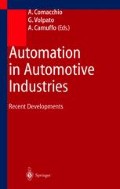Abstract
The world auto industry is currently experiencing the gradual diffusion of new organizing principles for manufacturing work, linked to a model of the overall production system — often called ″lean production″ (Womack, Jones, and Roos, 1990) or ″flexible production″ (MacDuffie, 1995) — that has significant productivity and quality advantages over traditional mass production. These organizing principles are increasingly likely to become the dominant model for automotive manufacturing. This provides an important opportunity to assess the extent and nature of the diffusion process, particularly across national borders, in light of past theories about the transfer of this kind of knowledge.
Access this chapter
Tax calculation will be finalised at checkout
Purchases are for personal use only
Preview
Unable to display preview. Download preview PDF.
References
Brannan, Mary Yoko and Jane Salk. 1994. “Cultural Dynamics in Biculturai Work Settings: Empirical Examples of Negotiated Culture”, presented at Academy of International Business conference, Boston, MA, Nov. 1994.
Cusumano, Michael. 1985. The Japanese Auto Industry: Technology and Management at Toyota and Nissan. Cambridge, MA: Harvard University Press.
DiMaggio, Paul J. and Walter W. Powell. 1991. The New Institutionalism in.
Organizational Analysis. Chicago: University of Chicago Press.
Florida, Richard and Martin Kenney. 1991. ″Transplanted Organizations: The Transfer of Japanese Industrial Organization to the U.S.″ American Sociological Review Vol. 56 (June), pp. 381–398.
Hofstede, Geert, M.H. Bond, and CL. Luk. 1993. “Individual Perceptions of Organizational Cultures: A Methodological Treatise on Levels of Analysis ”, Organizational Studies. Vol. 14, No. 4, pp. 483–503.
Kogut, Bruce and Udo Zander. 1992. ″Knowledge of the Firm, Combinative Capabilities, and the Replication of Technology.″ Organization Science. Vol. 3, No. 3 (August), pp. 383–397.
Kogut, Bruce. 1993. “On the importance of being inert,” in Organizational Theory and the Multinational Corporation. Sumantra Ghoshal and D. Eleanor Westney (eds.). New York: St. Martin’s Press.
Lewchuk, Wayne. 1988. American Technology and the British Car Industry. Cambridge, England: Cambridge University Press.
MacDuffie, John Paul. 1995. ″Human Resource Bundles and Manufacturing Performance-Organizational Logic and Flexible Production in the World Auto Industry,″ Industrial and Labor Relations Review. Vol. 48, No. 2 (January), pp. 192–221.
MacDuffie, John Paul and Frits Pil. 1995. “Work Practices and Manufacturing Performance in the World Auto Industry: The Diffusion and Adaptation of Lean Production in the U.S., Europe, and Japan,” submitted to Industrial Relations.
Nelson, Richard and Sidney Winter. 1982. An Evolutionary Theory of Economic Change. Cambridge, MA: Belknap Press.
Szulanski, Gabriel. 1994. “Unpacking Stickiness: An Empirical Investigation of the Barriers to Transfer of Best Practice Inside the Firm,” working paper.
Tushman, Michael and Elaine Romanelli. 1985. “Organizational evolution: A metamorphosis model of convergence and reorientation,” in B.M. Staw and L.L. Cummings (eds.), Research in Organizational Behavior, vol. 7: 171–222. Greenwich, CT: JAI Press.
Weiss, Stephen. 1994. “Culturally-Responsive Strategies in Negotiation: Developing Empirical Tests and Training Implications,” presented at Academy of International Business conference, Boston, MA, Nov. 1994.
Westney, Eleanor. 1987. Imitation and Innovation. Cambridge, MA: Harvard University Press.
Winter, Sidney. 1995. “Four Rs of Profitability: Rents, Resources, Routines, and Replication,” in Resource-Based and Evolutionary Theories of the Finn: Towards a Synthesis. Cynthia Montgomery (ed.), Hingham, MA: Kluwer Academic Publishers, pp. 147–178.
Womack, James, Daniel Jones and Daniel Roos. 1990. The Machine That Changed the World. New York: Rawson-MacMillan.
Editor information
Editors and Affiliations
Rights and permissions
Copyright information
© 1999 Springer-Verlag Berlin Heidelberg
About this paper
Cite this paper
MacDuffie, J.P. (1999). The Transfer of Organizing Principles in the World Auto Industry: Cross-Cultural Influences on Replication at Opel Eisenach. In: Comacchio, A., Volpato, G., Camuffo, A. (eds) Automation in Automotive Industries. Springer, Berlin, Heidelberg. https://doi.org/10.1007/978-3-642-59864-7_9
Download citation
DOI: https://doi.org/10.1007/978-3-642-59864-7_9
Publisher Name: Springer, Berlin, Heidelberg
Print ISBN: 978-3-642-64157-2
Online ISBN: 978-3-642-59864-7
eBook Packages: Springer Book Archive

